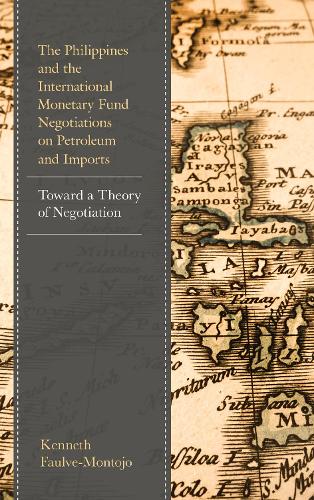
The Philippines and the International Monetary Fund Negotiations on Petroleum and Imports: Toward a Theory of Negotiation
(Hardback)
Publishing Details
The Philippines and the International Monetary Fund Negotiations on Petroleum and Imports: Toward a Theory of Negotiation
By (Author) Kenneth Faulve-Montojo
Bloomsbury Publishing PLC
Lexington Books
31st October 2018
United States
Classifications
Professional and Scholarly
Non Fiction
International economics
Politics and government
338.232709599
Physical Properties
Hardback
324
Width 159mm, Height 231mm, Spine 30mm
662g
Description
In their negotiations with the International Monetary Fund, Philippine chief negotiators attempt to build coalitions to implement reform. Deference and External-Internal sequencing tactics are quite common, but the theoretical literature has not examined the conditions under which they are effective or marginalized. This study uses a Within-Case Study Method of Causal Inference to examine twenty-four observations from the years 1984-1994 that examine the interaction of the Philippine chief economic negotiators with the IMF, the Chief of Governments, international and domestic, and cabinet and societal veto players on the issues of petroleum price and import reforms. Through this approach, the study rules out alternative deductive system level theories to explain economic outcomes; refines the two-level game framework, generates a midrange typology on the pattern of successes and failures of the negotiations, and provides recommendations on manipulable variables for policy makers. The study suggests that these tactics are constrained by the leverage and signal provided by international veto players and the interaction between formal and informal domestic institutions.
Reviews
Using the five economic programs negotiated by the International Monetary Fund (IMF) and the Philippines since the early 1980s as a case study, the author seeks to identify a set of practical implications and provide a theory of negotiations between actors with similar aims but divergent interests. He concentrates on the seminal importance of bargaining and the myriad of international and domestic issues that can affect the negotiations. Faulve-Montojo has tackled an extremely complex problem and succeeded beyond expectations. This is a well written, comprehensive, readable and sophisticated piece of scholarship destined to become a point of reference in the field of political economy. -- Constantine P. Danopoulos, San Jose State University
I must congratulate Dr. Montojo for his research. For policy makers with research staff that can go through the technical elements of the work, this work should be of great interest. It presents the complexities of policy making and above all of policy implementation in an environment where there are multiple players with multiple interests of their own. This work should prove very helpful to those who believe that economic reform, no matter how long it takes, is well worth the effort needed to pursue it over the long term, because in the end that is how the common good is served and promoted. Furthermore, economic reform becomes harder in situations where institutions are weak and are lacking of vision and a long-term strategy to contribute to the transformation of an economy in process of development. Finally, difficult as the eventual removal of the OPSF and a government-influenced pricing policy for oil may have been, still through forging alliances between domestic and international reform advocates, the Philippine case shows that it can be done. This represents one thorn removed out of the flesh of actual economic policy being implemented in the Philippines. I recommend this book for close reading by research analysts, who can help guide economic policy-makers and practitioners on lessons that can be gleaned from experiences such as the ones that Dr. Montojo has analylzed with great care and rigor. -- Jesus P. Estanislao, Institute for Solidarity in Asia
Dr. Montojo weaves a complex theoretical analysis of the negotiating interplay between the Philippines and the IMF spanning a number of decades. Thoroughly researched and documented, the focus on petroleum price support systems and import reform policies lends itself to a comprehensive understanding of the what we assume is the normal conditionality of these negotiations. What Dr. Montojo reveals is a much more layered and nuanced understanding of the power relationships at play and that the dynamics are more even-handed than one might expect. Truly a definitive study of political and economic development of the Philippines and the role of international financial institutions. -- Peter H. Loedel, Director of the Center for International Programs
Author Bio
Kenneth Faulve-Montojo is a lecturer at Santa Clara University.
